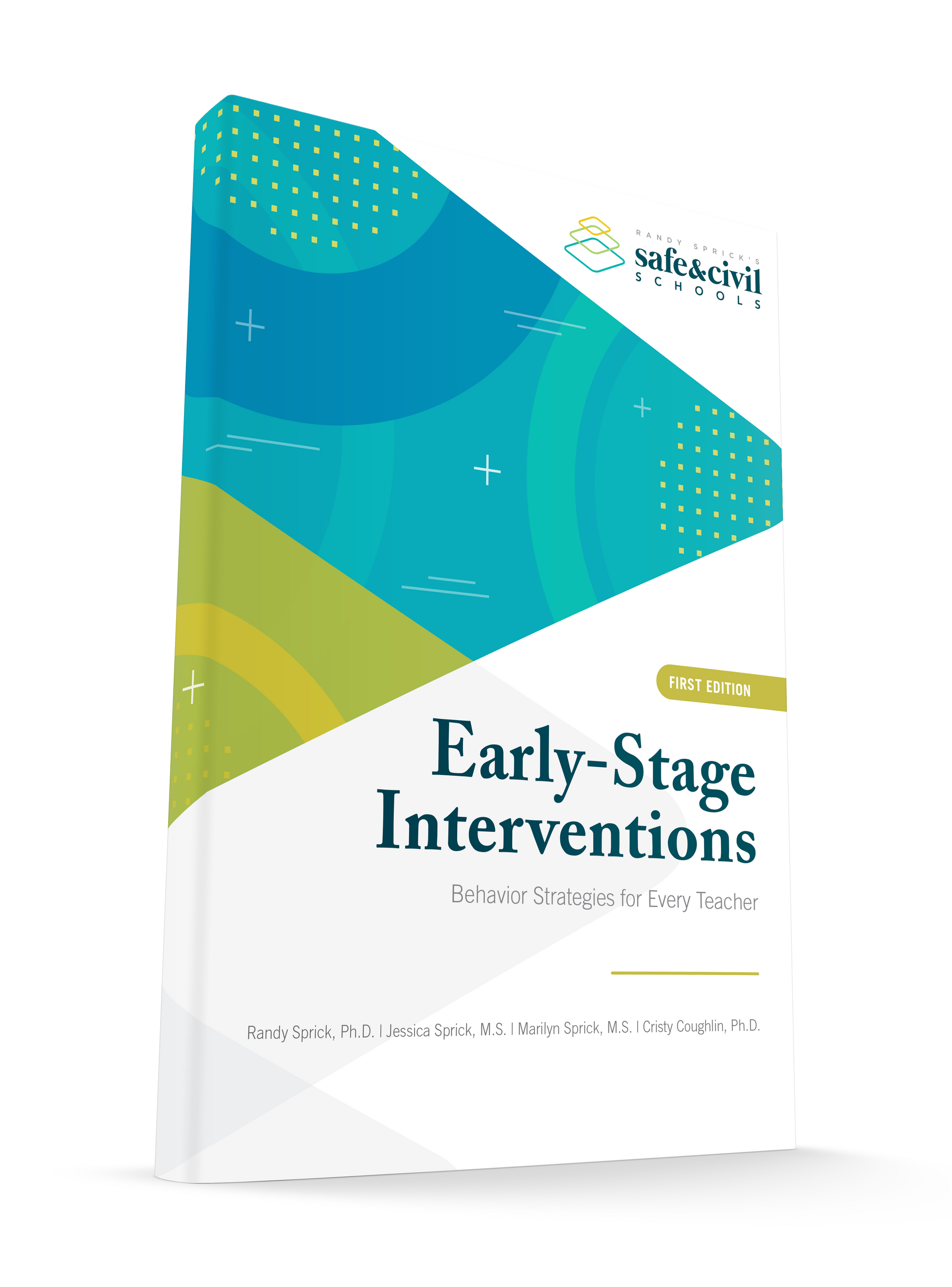Early-Stage Interventions

Behavior strategies for every teacher
Early-Stage Interventions
Early-Stage Interventions training will introduce teachers to simple, effective interventions to use as a starting place in addressing an individual student’s chronic misbehavior— disrespect, noncompliance, lack of motivation, bullying, aggression, and more. Though every teacher will encounter students who display challenging behavior, many feel unprepared to effectively deal with such behavior in the classroom. Early-Stage Interventions training empower teachers in grades K–12 to address behavior issues in the classroom before the problem escalates. Teachers will learn to:
- Plan and implement a sequence of simple classroom interventions to address an individual student’s chromic misbehavior
- Collect data to determine the scope of a problem and assess the effectiveness of interventions
- Identify and improve classroom management issues that may be contributing to student misbehavior
- Consider academic issues that may play a role in student misbehavior
- Address problem behavior in its early stages so a school’s Tier 2 and 3 resources can be focused on the most difficult problems
Teachers and other staff report the following outcomes:
- Create and maintain productive, respectful learning environments.
- Respond effectively to behavior, discipline, and motivation problems.
- Develop a repertoire of evidence-based strategies such as planned discussion, using reinforcement, responding consistently to inappropriate behavior, setting goals, and so on.
- Learn to collect data to ensure that the function of the behavior is identified and that results of intervention can be evaluated objectively.
Tailored professional development that addresses your school's highest needs
Early-Stage Interventions training
Call 1-800-323-8819 to create a plan that addresses your current needs or use our CONTACT US form below.
In addition to tailored Early-Stage Interventions training, Safe & Civil Schools can include Early-Stage Interventions training as part of schoolwide CHAMPS/DSC training or Foundations training, which giuides schools in designing a proactive and positive schoolwide discipline plan that establishes a positive school climate and culture, and addresses all aspects of school safety, student motivation, and academic engagement.
Simple, efficient, preventive
Stop misbehavior at its onset
Early-stage Interventions training for the classroom teacher can provide both practical and essential tools for managing student behavior effectively and efficiently. These interventions are designed to serve as a first response when students begin to show signs of chronic misbehavior, focusing on simple, low-cost strategies that can yield significant results.
For example, something as straightforward as a brief conversation with a student may lead to improved behavior, reducing the need for more complex or resource-heavy strategies. If the initial attempt is unsuccessful, educators can escalate interventions along a continuum, choosing more intensive supports only as needed. This approach conserves limited school resources while still addressing student needs effectively.
Teachers play a central role in early-stage interventions, much like primary care providers in the medical field. They observe students daily, recognize emerging behavior patterns, and are well-positioned to respond quickly. Research shows that when teachers are equipped with clear guidelines and appropriate tools, they can accurately identify students who are struggling and intervene reliably. This early action is vital because most classroom misbehavior is minor, such as inattention or off-task behavior, which can escalate into more serious issues if ignored.
Proactive intervention helps prevent this escalation, maintaining a more positive and productive learning environment. In addition, early-stage interventions help close the gap between general and special education. Chronic misbehavior is the most common reason students are removed from general classrooms, yet recent legislation encourages inclusive education, mandating that students with disabilities be served in the least restrictive environment possible.
With only a small percentage of students qualifying for special education services, most behavior issues must be managed within the general classroom. Moreover, data supporting the effectiveness of separate settings for behavior support is limited, while inclusive classrooms have been shown to offer academic, social, and emotional benefits for all students. Rather than isolating students with behavior challenges, early and targeted interventions can allow them to succeed in the general education setting with minimal disruption. This approach not only supports struggling students but also enriches the learning environment for their peers.
Finally, Early-stage interventions training can play a crucial role within a Multi-Tiered System of Supports for Behavior (MTSS-B) by empowering teachers to be the first line of response when students exhibit early signs of behavioral challenges. These interventions, implemented independently by a teacher are then significantly enhanced when embedded within a schoolwide MTSS-B framework. This model ensures that resources and interventions are matched to the intensity of students’ needs, starting with simple, low-cost strategies and progressing to more intensive supports as necessary. Early-stage interventions reflect MTSS-B’s core principle: always begin with the least intrusive, most efficient approach with a reasonable chance of success before escalating. Early-stage intervention training provides a structured, equitable, and evidence-based way to address behavioral concerns before they escalate, promoting success for all students within the general education environment.

Our research-based titles supporting professional development
Early-Stage Interventions Programs and Resources
These research-based and practical resources from Ancora Publishing support our consultants in helping school leaders develop their skills.
Early-Stage Interventions: Behavior Strategies for Every Teacher
Early-Stage Interventions: Behavior Strategies for Every Teacher offers a set of simple, teacher-friendly interventions to use as a starting place in addressing an individual student’s chronic misbehavior— disrespect, noncompliance, lack of motivation, bullying, aggression, and more. Though every teacher will encounter students who display challenging behavior, many feel unprepared to effectively deal with such behavior in the classroom.
Together, we can make a difference.
Contact Us Today for More Information
Call 1-800-323-8819 to create a plan that addresses your current needs or use our CONTACT US form below.
